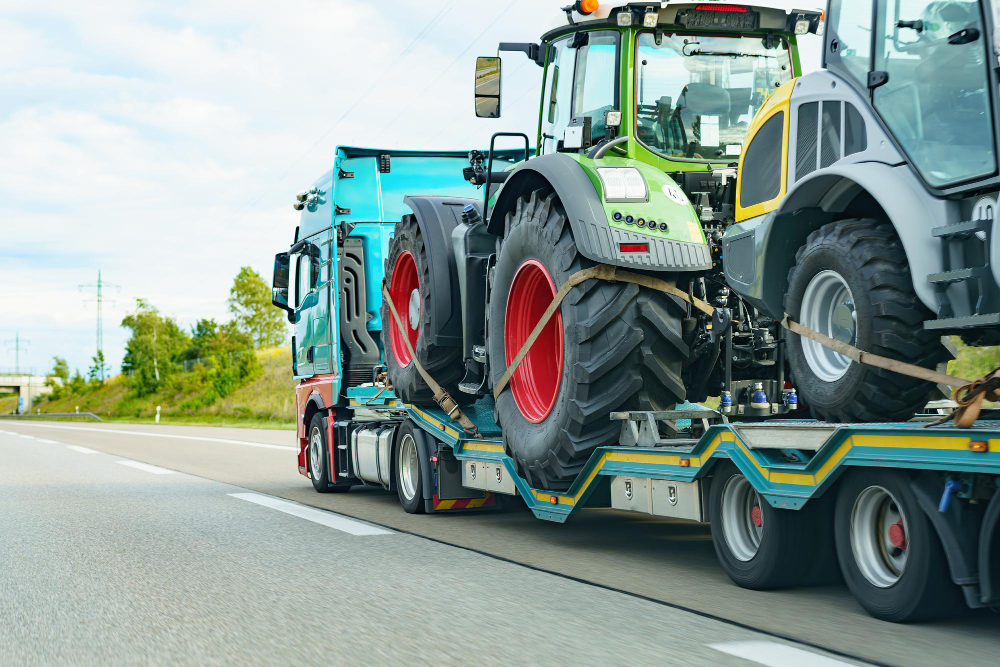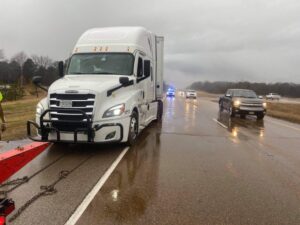The rich agricultural landscape surrounding Memphis depends heavily on the safe and efficient movement of farm equipment. Whether you’re relocating tractors between fields, transporting combines during harvest season, or moving specialized agricultural machinery across county lines, farm equipment transport presents unique challenges that go well beyond standard vehicle towing.
At Trustworthy Towing Service Memphis, we’ve assisted countless farmers and agricultural businesses with heavy-duty towing needs, and we understand the complexities involved in moving these valuable assets safely and legally. Call us at (901) 401-4025 when you need professional assistance with oversized agricultural equipment. In this guide, we’ll walk you through the essential regulations, preparation steps, route planning strategies, and securing methods to ensure your farm equipment arrives safely at its destination.
Tennessee Regulations for Farm Equipment Transport
Are you familiar with all the legal requirements for moving your agricultural machinery on Tennessee roads? Farm equipment transport in our state is governed by specific regulations that every operator should understand.
Tennessee Department of Transportation (TDOT) has established clear guidelines for agricultural equipment movement, especially for oversized machinery. Standard farm equipment like tractors and combines often exceed the normal width restrictions for highway vehicles. In Tennessee, farm implements wider than 8’6″ but less than 13′ wide can typically be moved without a special permit during daylight hours, but there are important exceptions and additional requirements.
When transporting equipment that exceeds legal dimensions, you’ll need to consider:
- Permit requirements: Farm equipment exceeding 13′ in width, 13’6″ in height, or 80,000 pounds requires an oversize/overweight permit from TDOT. These permits specify your approved route and travel conditions.
- Time restrictions: Most oversized farm equipment transport is restricted to daylight hours, typically 30 minutes after sunrise until 30 minutes before sunset. No movement is typically allowed on major holidays or holiday weekends.
- Escort vehicles: Equipment wider than 12’6″ requires at least one escort vehicle, while loads exceeding 14′ often require two escorts (one in front and one behind).
- County line considerations: When crossing county lines, additional permits may be required. Always check with each county’s highway department before planning your route.
Non-compliance with these regulations can result in significant fines, delays in transport, and even potential liability issues if an accident occurs. Taking time to understand and follow these rules protects both your equipment and other road users.
Pre-Transport Farm Equipment Preparation Checklist
How ready is your farm equipment for the journey ahead? Proper preparation before transport saves time, prevents damage, and ensures safety.
Before loading any piece of farm equipment for transport, conduct a thorough inspection to identify any potential issues. Check for loose or damaged components that could become dislodged during transit. Secure or remove any detachable parts that might create hazards on the road.
Focus on these key preparation areas:
- Fluid management: Check all fluid levels and address any leaks before transport. Hydraulic fluid, oil, or fuel leaks can create dangerous road conditions and damage your equipment. Consider draining certain systems if the transport will involve significant tilting or unusual positioning.
- Proper marking: Equipment extending beyond normal width limits must be properly marked with flags during daylight hours (red or orange flags at least 12″ square) and lights during darkness. The extremities of your load should be clearly visible to other drivers from all angles.
- Component security: For equipment with folding mechanisms like planter wings or combine headers, use manufacturer-approved transport locks or pins. If these aren’t available, use heavy-duty straps or chains as secondary security measures.
- Documentation: Carry all relevant paperwork including equipment registration, insurance information, operating manuals (which often contain transport instructions), and any required permits. Keep these documents easily accessible during your journey.
- Removal of soil/debris: Clean equipment thoroughly before transport, especially if moving between fields. This prevents spreading weeds or contaminants and reduces the amount of debris that might fall onto roadways.
We always recommend taking photos of your equipment before loading. This documentation helps in case of any disputes and serves as a reference for properly reassembling components at your destination.
Route Planning for Safe Farm Equipment Transport
Have you mapped out the safest and most efficient route for your oversized agricultural machinery? Thoughtful route planning is perhaps the most critical aspect of successful farm equipment transport in the Memphis area.
The routes suitable for passenger vehicles often present significant challenges for large farm equipment. When planning your journey, consider these important factors:
- Bridge and overpass clearances: Many pieces of farm equipment exceed standard height limitations. Research your route thoroughly for low bridges, overpasses, and power lines. The standard minimum clearance on Tennessee highways is 13’6″, but many farm implements exceed this height.
- Weight restrictions: Older bridges or rural routes may have weight limitations that won’t accommodate heavy equipment like loaded grain carts or large tractors. Check TDOT resources for weight-restricted routes before departure.
- Road width concerns: Memphis-area highways vary significantly in width. Equipment wider than a standard lane requires special consideration, possibly including escort vehicles or traveling during lower-traffic periods.
- Construction zones: Active construction can create narrow passages that may be impassable for wide equipment. Check the TDOT SmartWay map or call 511 for current construction information before beginning your journey.
- Traffic patterns: When possible, schedule transport during off-peak hours to minimize congestion. Early Sunday mornings typically offer the lightest traffic conditions in the Memphis area.
Several digital tools can assist with route planning for oversized loads. Specialized transportation apps like Drivewyze and TruckMap provide information about restricted routes, low clearances, and weight limitations specific to commercial and agricultural vehicles.
Loading and Securing Best Practices for Farm Equipment Transport
Is your valuable farm equipment properly secured for transit? The right loading and securing techniques prevent damage and ensure safety during transport.
Different types of farm equipment require specific loading approaches. Self-propelled equipment like tractors and harvesters can often be driven directly onto trailers, while towed implements require different handling. Always follow manufacturer guidelines for loading procedures when available.
Consider these critical securing practices:
- Appropriate tie-down points: Use only designated tie-down points on your equipment. Securing to hydraulic lines, steering components, or decorative features can cause damage and create unsafe conditions. Most equipment has specifically designed anchor points marked by the manufacturer.
- Proper chain and strap tension: Chains and straps should be tight enough to prevent movement but not so tight that they damage the equipment. Use load binders or tensioners to achieve proper security without excessive pressure.
- Strategic placement: Position the heaviest part of the equipment over the trailer axles when possible. This improves stability and handling during transport. For articulated equipment, use manufacturer-recommended transport locks to prevent movement.
- Multiple securing methods: Use a combination of chains, straps, and blocks for maximum security. The general rule is a minimum of four tie-down points, with additional points for larger equipment.
- Regular transit checks: For longer journeys, stop periodically to inspect your securing systems. Vibration and movement can cause straps and chains to loosen during transport.
One often overlooked aspect is securing hydraulic cylinders. Many farmers don’t realize that hydraulic systems can extend or contract during transport due to temperature changes or vibration. Secure these components in their recommended transport position using manufacturer-approved locks or pins.
When to Consider Professional Farm Equipment Transport Services
Are there times when DIY transport isn’t the best option for your valuable agricultural machinery? Recognizing when to call professionals can save time, prevent damage, and ensure compliance with regulations.
While many farmers handle their own equipment transport for short distances, certain scenarios warrant professional heavy-duty towing expertise:
- Extremely oversized equipment: Combines with headers attached, wide planters, or tall sprayers often exceed dimensions that can be safely transported without specialized equipment and permits.
- Interstate transport: Moving farm equipment across state lines involves navigating different regulations and permit requirements, which professional services handle regularly.
- Limited transport equipment: If you don’t own appropriate trailers or towing vehicles rated for your equipment’s weight, professional services offer the right tools for the job.
- High-value new equipment: Brand new or expensive precision agriculture equipment often benefits from professional handling to prevent any transport-related damage.
- Challenging routes: Urban areas, congested highways, or routes with multiple low clearances or weight restrictions may require professional navigation expertise.
At Trustworthy Towing Service Memphis, we provide heavy-duty towing services specifically designed for agricultural equipment. Our experience with oversized loads and farm implements means we understand the unique requirements of transporting everything from tractors to combines to specialized harvesting equipment.
When selecting a transport service, look for companies with specific agricultural experience, proper insurance coverage for high-value equipment, and a fleet capable of handling your specific machinery types.
Ensuring Safe and Compliant Farm Equipment Transport
Moving agricultural machinery requires careful planning, proper preparation, and thorough knowledge of regulations. By following the guidelines we’ve outlined for farm equipment transport, you’ll minimize risks, prevent costly delays, and ensure your valuable equipment arrives safely at its destination.
Remember that regulations change periodically, so always verify current requirements before transporting oversized agricultural equipment. When in doubt about the best approach for moving your specific machinery, don’t hesitate to consult with experienced professionals.
At Trustworthy Towing Service Memphis, we’re committed to supporting our local agricultural community with reliable farm equipment transport services. Our team understands the unique challenges of farm equipment transport and provides solutions tailored to your specific needs. For assistance with moving agricultural machinery or for emergency recovery services, contact us at (901) 401-4025. We’re available 24/7 to help keep your farming operations moving forward safely and efficiently.


